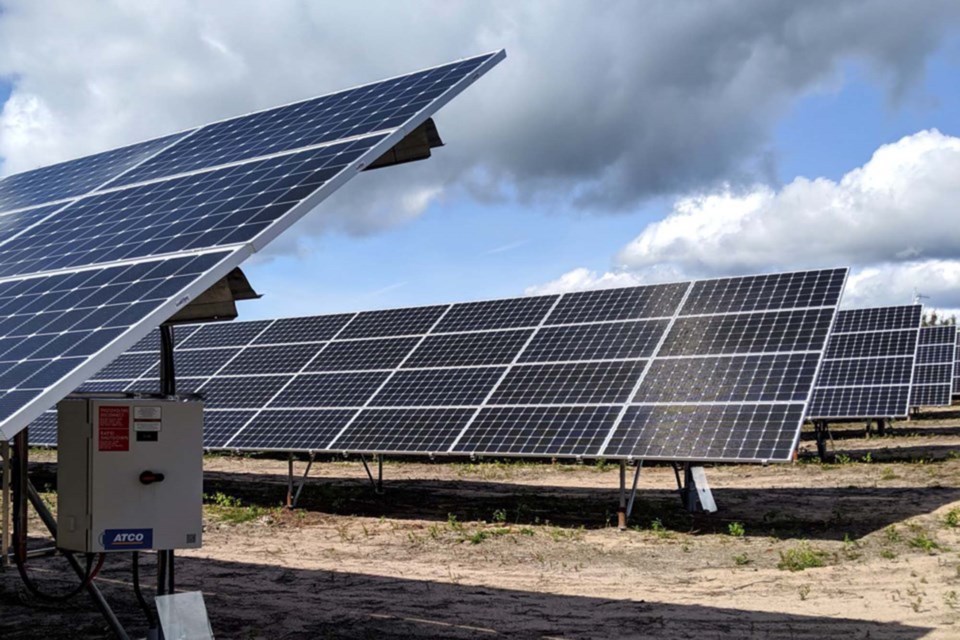The city is set to move forward to second and third readings of a borrowing bylaw for the Badger Lands solar farm on Aug. 30, which would enable St. Albert to borrow up to $33.75 million over 20 years to fund the project.
The estimated cost for the project is $26.1 million, but the total borrowed amount factors in a 25-per-cent contingency.
ATCO, the firm that conducted the solar farm feasibility study for the city, has said the 15-megawatt solar farm will power up to 2,500 homes, and is projected to generate around $2.42 million a year, but these numbers have been challenged by residents and experts since their release.
Frank Vagi, a St. Albert resident and chemical engineering instructor at the University of Alberta, has spent his career specializing in utility systems and energy efficiency.
Vagi addressed council on June 21 regarding concerns about the solar farm. In an interview with The Gazette, he said he still holds doubts about the project, giving the example of numbers used in the solar farm business case the city has not made publicly available, such as the power price, carbon price, and interest rate used in calculations.
“What can’t the city release the actual model they used for their financial projections? Why is it so secretive?” Vagi asked. “The reason it’s secretive is because it doesn’t pay out.”
Council passed the first reading of the bylaw 6-1, with Coun. Sheena Hughes opposed. Bylaws require three readings to go into effect. Now that the first reading has passed, a 15-day petition period will begin on Aug. 11 and end on Aug. 26.
If a petition effort is mounted to try and force a plebiscite on the issue, the organizers will have to collect signatures from at least 10 per cent of the population of St. Albert. These signatories must be from valid voters.
If no petition arises, the city will proceed to a second and third reading of the bylaw.
Mayor Cathy Heron declined an interview with The Gazette in advance of the borrowing bylaw coming before council.
In a previous conversation with The Gazette, city strategic services director Paul Pearson said the firm that conducted the solar farm feasibility study — ATCO — used a proprietary model developed by the company Boost to forecast energy prices. He said this model could not be expressed with a single number.
In order for St. Albert’s solar farm project to be successful, Vagi said it would need to be carried out on a much larger scale. He argued that it would make more sense for the city to allow ATCO to lease the land and operate the solar farm on the city’s behalf.
“The only way I can see this being a positive business case is if ATCO stepped up and did it,” Vagi said. “They have the expertise in-house. Let ATCO take the risk, and let them operate it.”
Mike Killick, a St. Albert resident, raised similar concerns about the solar farm, arguing that council was “very optimistic” in its projections of what revenue the solar farm would generate.
“Without better details around some fundamental questions, I don’t see enough there for council to support the bylaw on the second and third reading,” Killick said.
Killick argued that the lack of a power purchase agreement — a contract that would guarantee the sale of the solar farm's energy for a set amount of time — was also a concern, arguing that continuing to pursue the project without one could pose a risk. Further, he added he would like to see a developer weigh in on alternative uses for the Badger Lands.
The Badger Lands is currently designated as land that is contaminated with salt. This means the land would have to be remediated before it could be developed. The city has estimated the cleanup would cost between $15.5 million and $25 million.
“If a developer was given a chance to look at that land, they might find out that remediation costs don’t prohibit them from buying it,” Killick said.
Additionally, Killick pointed out that the business case was centred around paying back the amount the solar farm is projected to cost, $26.1 million, rather than the full $33.75 million the city is looking to borrow.
“It concerns me that residents are on the hook for the repayment of any of the debts,” Killick said. “I’m positive on green energy, but what I would like to see is a clear business case showing the costs that also takes into account the value of the land.”
The borrowing bylaw does not require a public hearing. If residents would like to address council on the borrowing bylaw, their request to speak must be received by email sent to [email protected] by 10 a.m. on Aug. 30.
The city is also in the process of looking into a detailed business case for a Municipal Energy Corporation, which aims to incorporate the solar farm into its portfolio, in addition to a small-scale solar power program, electric vehicle charging stations, and an energy marketing venture.
If approved, the farm would start construction in July 2022 and be operational by April 2023.




